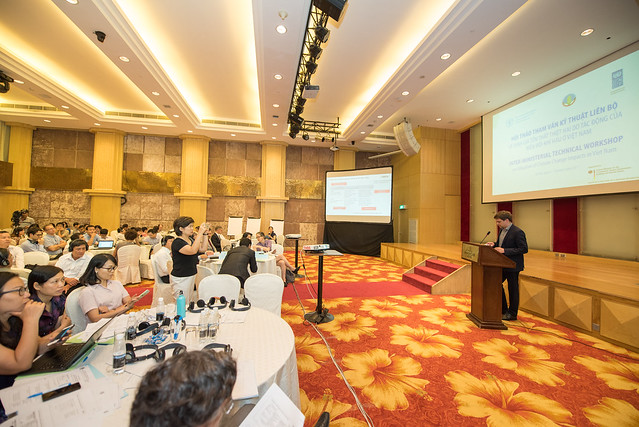29 August 2017 - What systematic financial risks and fiscal impact does climate change pose? What are some of the emerging frameworks for valuing climate-related damage in key sectors such as agriculture and water resource management? What are good practice examples of partnerships to mitigate systematic climate risk and related losses?
These were just some of the questions discussed at a high-level inter-ministerial workshop held in Hanoi June 6-7, 2017 hosted by the Ministry of Agricultural Development (MARD) of Viet Nam and supported under the Integrating Agriculture in National Adaptation Plans (NAP-Ag) Programme. The NAP-Ag Programme is a joint effort led by the United Nations Development Programme (UNDP) and the Food and Agriculture Organization of the United Nations (FAO) to support countries to integrate and address climate change concerns as they affect agricultural sector-based livelihoods in national and sectoral planning and budgeting processes. The programme is funded by the German Federal Ministry for the Environment, Nature Conservation, Building and Nuclear Safety (BMUB) through its International Climate Initiative (IKI).
Attended by over 75 national and provincial level government officials, including the Ministry of Natural Resources and Environment (MONRE), Ministry of Agriculture and Rural Development (MARD), Ministry of Planning and Investment (MPI) and the Ministry of Finance (MOF), UN and development partners, private sector representatives including insurance companies, as well as non-governmental organisations, the workshop was the first of its kind in the country.
Viet Nam's Deputy Minister of Agriculture and Rural Development, Hoàng Văn Thắng, said that Viet Nam needs tools to calculate damage relating to climate change impacts to improve natural disaster response and mitigation work (Viet Nam News). According to the Deputy Minister, this loss and damage valuation should include identifying climate change’s negative impacts on socio-economic development, economic and non-economic losses, resettlement, permanent loss, restoration, insurance, social welfare and compensation.
Following a presentation by MONRE on climate change projections and the impact of slow-onset climate variation as well as extreme events, and MARD’s presentation on Viet Nam’s Disaster Prevention and Control Law and institutional arrangements for managing emerging climate and disaster risk, the MOF provided reflections on the cost of climate change impacts for Viet Nam and announced its intention to ramp up state funding to address this mounting challenge.
UNDP presented on emerging cost-related decision-making tools for climate change risk in Viet Nam and an overview of risk management tools and entry points for integrating valuations of disaster risk reduction and climate change adaptation into planning. It also presented the results of a case study with IPSARD on systems for recording climate damage based on the 2015/2016 drought.
“Recent evidence of extreme drought and El-Nino in 2015-2016 suggested that millions of Vietnamese farmers were affected greatly and the country’s economy was equally affected. If no mechanism is used to deal with long-term climate patterns, the social and economic development gains in Viet Nam will rapidly diminish,” UNDP Deputy Country Director Akiko Fujii said.
This was complemented by presentation by the MunichRe Climate Risk Insurance Initiative and InsuResilience Initiative on key tools, methods and planning practices for managing climate-related financial risk from around the world. This was complemented by a view from the private insurance sector on lessons learned from small-scale insurance mechanisms available to farmers as well as a scoping of potential areas for public-private partnerships and sector regulatory reform by VINARE, a SwissRe affiliate.
Overall the dialogue highlighted that there is already significant work relevant to managing the financial risk of climate change on-going in Viet Nam and potential to share learning both within the country and internationally. Following panel discussions, three breakout groups were conducted to come up with an action plan on the following issues:
Strengthening risk and data assessment
Further develop systems and databases for current damage and loss, and capacity for strengthening data collection and aggregation. Look at options to extend these systems to look at other climate change related risks, and to better estimate financial losses. This includes for example widening of scope to new impact categories and generally the inclusion of probabilistic models including climate change impacts. This could include working with the Expert Group on Comprehensive Risk Management in the Warsaw International Mechanism.Enhance financial climate risk management tools
Step up work to proactively manage public financial liabilities from climate-related risk and climate change. Establish the right strategies and assessment tools to streamline relevant response plans also to see the specific value of risk transfer solutions. Look at how processes like improved damage and loss estimation can help inform policy making and the NAP process. Step-up work on testing and extending the use of risk transfer mechanisms, including insurance and use the Risk Transfer Clearing House as an entry point.
Strengthen linkages and coordination across ministries
Better information sharing is critical to achieving comprehensive risk management that can overcome siloed thinking (e.g. between the climate adaptation and DRR community). One step in this process would be for the Government of Viet Nam to assign a risk officer as a national focal points for UNFCCC & Warsaw International Mechanism discussions.
Links
See news and videos from the workshop.
Presentations
Glenn S. Hodes, Climate Policy and Finance Specialist, glenn.hodes@undp.org

